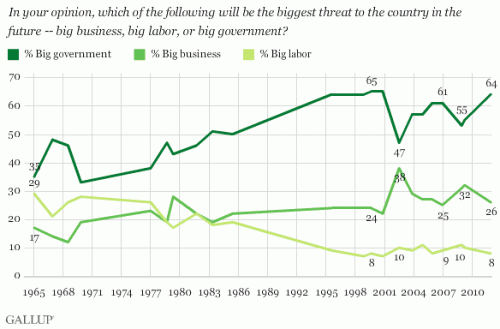I’m not a big fan of Senator Schumer of New York. As I’ve noted before, he’s a doctrinaire statist who wants the government to have control over just about every aspect of our lives.
But that describes a lot of people in Washington. I guess what also bothers me is his willingness to say anything, regardless of how divorced it is from reality, to advance his short-run political agenda (sort of a Democrat version of Karl Rove).
For example, here’s part of what the clownish Empire State Senator recently had to say about fiscal policy, as reported by a Washington Post columnist.
Schumer said, “…Republicans came in and said, `We can solve your problem by shrinking government’…We tried their theory…The American people resent government paralysis, but most of them would say that government is doing too little to help them, not too much.”
What’s remarkable about this statement is that it’s so inaccurate that we can’t even decipher what he means. I’ve come up with three possible interpretations of what he might have been trying to say, and they’re all wrong.
1. He’s referring to GOP actions this year. This interpretation might make partial sense because the House Republicans have made a few semi-serious efforts to shrink government, but how can Schumer say “we tried their theory” when every Republican initiative was blocked by the Senate and Obama?
The Ryan budget died of malign neglect since the Senate didn’t even bother to produce a budget, and Republican efforts on the 2011 spending levels and the debt limit also were stymied, resulting at best in kiss-your-sister deals.
Recommended
2. He’s referring to GOP actions during the Bush Administration. This interpretation might make some sense because the GOP did control the House, the Senate, and the Presidency, but does Schumer understand that “shrinking government” was not part of the Republican agenda during those years?
But don’t believe me. The numbers from the Historical Tables of the Budget unambiguously show that the federal budget almost doubled during the Bush years because of huge increases in domestic spending.
3. He’s referring to GOP actions during the 1990s. This interpretation actually does make sense because the burden of the public sector did shrink as a share of GDP during the Clinton years when Republicans controlled Congress, so it would be accurate to say “we tried their theory.”
But what was so bad about the era of spending restraint during the 1990s? The economy expanded and people were better off, in large part because, to quote Schumer, government was “doing too little to help them.”
Heck, the Clinton-GOP Congress years were so good that I even offered, during a debate on national TV, to go back to Clinton’s higher tax rates if it meant we also could undo all the reckless spending of the Bush-Obama years.
This doesn’t mean I’ve stopped caring about low marginal tax rates. It just means that I understand that the ultimate tax is the burden of the public sector. This video explains more, in case you’re wondering why I’d like to go back to the 1990s.
It goes without saying (but I’ll say it anyhow) that it would be even better to combine Clinton’s spending levels with Reagan’s tax rates.
I posted some polling data a couple of weeks ago that showed how the dependency mindset (as captured by these cartoons) is far worse in Europe than it is in the United States.
Now let’s look at some additional public opinion research from Gallup that illuminates American exceptionalism. Here is how voters responded to a question on the biggest threat to America’s future.
Though I don’t want to get too optimistic. Given what’s happening in Europe and the fact that politicians so far have failed to enact genuine entitlement reform, the 64 percent should be 94 percent


























Join the conversation as a VIP Member